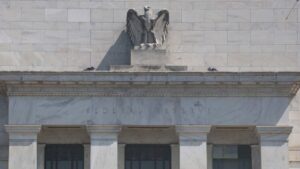Why do high-yield savings account rates fluctuate?




Your savings account has a variable interest rate, so your bank can choose to raise or lower that rate at any time. Due to this, the yield you’re currently earning might not be the same as it was last year or even last month.
While such rate changes are ultimately up to the bank, there are several factors that can influence its decision to move its rates in either direction. These include changes to the federal funds rate, macroeconomic conditions and whether the bank is in need of deposits.
Here we’ll go over things that cause savings account rates to fluctuate. Then we’ll provide some tips for finding a savings account that earns a highly competitive yield.
What is APY?
An account’s annual percentage yield (APY) is a number that indicates how much interest a bank account will earn in a year. It incorporates the effect of compounding interest, which is essentially the interest you earn on interest. Thanks to compound interest, your savings account earns interest not only on the principal but also on the interest that accumulates over time.
The APYs earned on savings accounts can vary widely from bank to bank. While the national average is 0.61 percent, it’s not difficult these days to find a high-yield savings account with an APY of 4 percent or higher.
Factors that affect savings account APYs
Federal funds rate
When the Federal Reserve raises or lowers its benchmark rate, many banks tend to adjust their borrowing rates and savings account rates in tandem. The Fed lowered its federal funds rate three times in 2024. So far, rates have remained steady during the first quarter of 2025. As a result, many banks have maintained rates for their deposit account APYs accordingly.
When banks need more deposits
A bank may decide to raise its savings account APY if it feels the need to attract more customers and their cash. This may be the case if a bank wants additional funds in order to make more loans or increase its investments.
Financial institutions looking for more cash may include newer banks or online banks, which can offer high yields as a way to draw customers from large brick-and-mortar banks — many of which pay rock-bottom APYs on their savings accounts.
Banks may also raise their APYs simply to compete with other banks, so as not to lose customers to others that offer higher rates.
Why should I have a high-yield savings account?
When you keep your money in a savings account that pays very little interest instead of a high-yield savings account, you’re losing out on hundreds — if not thousands — of dollars in interest in a year. This extra money could be used for practical purposes like paying down debt, or it could be used for discretionary spending on things like vacations or other family activities.
For example, depositing $10,000 in a high-yield savings account at 4 percent APY right now could earn you nearly $400 more in interest than if you put the same amount into an account with a rock-bottom yield of 0.01 percent APY — if you leave the money untouched and the variable rate doesn’t change much.
A savings account interest calculator can come in handy for determining how much you can earn in interest over time. Just plug in how much is in the account, how much you plan to contribute over time and what APY you’re earning.
Is my money safe in a savings account?
Yes, your money is safe as long as you’re with a financial institution that’s federally insured. The Federal Deposit Insurance Corp. (FDIC) insures funds up to $250,000 per depositor, per FDIC-insured bank, per ownership category. The National Credit Union Administration (NCUA) similarly insures up to $250,000 per share owner, per insured credit union, for each account ownership category.
When your money is federally insured, it guarantees the funds are safe in the event of a bank failure, as long as you’re within the stated limits and guidelines. Federally insured banks and credit unions often state prominently on their websites that they carry this insurance. You can also see if an institution is insured by conducting a search on the FDIC’s BankFind Suite or the NCUA’s Credit Union Locator.
Why we ask for feedback Your feedback helps us improve our content and services. It takes less than a minute to complete.
Your responses are anonymous and will only be used for improving our website.




